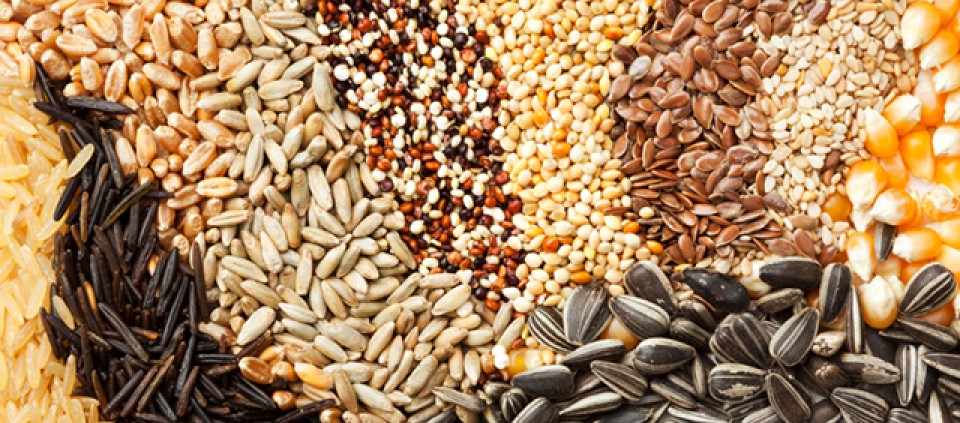Gluten and Your Gut

More and more doctors are looking at food sensitivities, not just full-blown allergies (think peanuts or shellfish), as a way to understand chronic digestive problems and irritable bowel syndrome (IBS). Ninety percent of all food-related allergic reactions in the United States come from just eight foods: milk, eggs, wheat, soy, fish, shellfish, peanuts, and tree nuts. Out of the eight, there has been a new focus on wheat (more specifically the protein in wheat called gluten) as an increasing number of people seem to have trouble digesting it.
When I was first diagnosed with IBS in my 20s, extensive allergy testing found that I wasn’t allergic to wheat or gluten, though my “gut” was telling me otherwise. Around that time, I noticed that I would feel exhausted and bloated after eating pasta or pizza, or drinking a beer—so I was surprised that the tests didn’t back up my hunch.
Kripalu presenter and integrative nutritionist Kathie Madonna Swift recommends paying attention to what your body is telling you. She says that even if tests don’t show you have a full-blown wheat or gluten allergy, you can still have a reaction to eating gluten. Some have what's known as non-celiac gluten sensitivity, which can cause the same symptoms as someone with full-blown celiac disease. Either way, Kathie says, you’ll benefit from a gluten-free diet.
Kathie says there’s growing evidence that gluten and even some dairy intolerances are related to not only abdominal pain, bloating, diarrhea, and constipation but also a host of autoimmune diseases and medical problems not necessarily associated with the gut. Those include acne, thyroid issues, osteoporosis, and, surprisingly, neurological conditions.
Kathie and Kripalu Lead Nutritionist Annie B. Kay advise those who think that they may have a gluten sensitivity to try an elimination diet during their stay at Kripalu. There’s no one-size-fits-all approach to going gluten-free, Annie says; she suggests keeping a daily food journal to record how you feel after a meal, so you can start to notice if your digestion is improving.
If you’ve thought about going gluten-free or want to know more, here are some helpful guidelines.
What grains can you eat on a gluten-free diet?
Amaranth, buckwheat, corn, millet, quinoa, rice, and teff.
What foods contain gluten?
One of the challenges of cutting out gluten is that it’s in far more than just wheat products. Did you know that couscous, matzoh, spelt, pumpernickel, and malt beverages all contain gluten? Here’s a guide to gluten-containing products:
- Wheat: bulgar, couscous, cracked wheat, dinkel, durum, einkorn, emmer, faro, farina, graham, hydrolyzed wheat starch, kamut, matzoh, orzo, seitan, semolina, spelt, sprouted grains, wheat bran, wheat germ, wheat grass, wheat starch, wheat berries, Wheatena, whole wheat
- Rye: all forms including whole rye, rye flour, pumpernickel, and triticale (a cross between wheat and rye)
- Barley: all forms of barley, malt, malt beverages, malt flavoring, malt extract, malt syrup, malt vinegar
- Oats: all forms of oats, steelcut oats, oatmeal, oat bran, oat flour (however, you can look for certified gluten-free oats)
- Flour: plain flour, white flour, wheat flour, whole wheat flour, whole white flour, self-rising flour, enriched flour, durum flour, gluten flour, bromated flour, unbleached flour, graham flour, barley flour, rye flour, oat flour.
A final word to the wise: Annie recommends avoiding “gluten-free junk food”—highly processed snack bars, cereals, and gluten substitutes, which are often loaded with sugar. Instead, opt for whole foods—a piece of fruit or cut-up vegetables. A lot of gluten-free products are highly processed and can irritate one's digestion and cause other health issues.
Find out about cooking and nutrition programs at Kripalu.
© Kripalu Center for Yoga & Health. All rights reserved. To request permission to reprint, please e-mail editor@kripalu.org.
Jennifer Mattson is a writer, speaker, and journalist. She leads writing workshops throughout the country and reports on mindfulness, yoga, wellness, healthy living, books, arts, and culture.
Full Bio and Programs